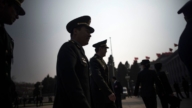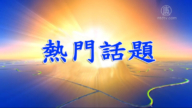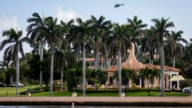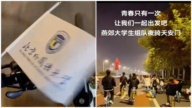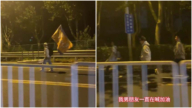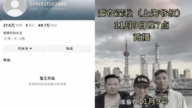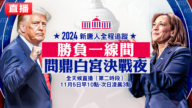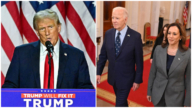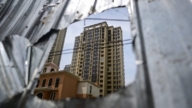【新唐人2011年7月8日讯】中国人民银行7月6号宣布,将金融机构一年期存贷款基准利率,分别上调0.25个百分点。这也是大陆央行今年内第三度加息。分析人士认为,央行这次加息是为了抑制迅速增强的通胀压力。但专家指出,失败的经济政策和货币政策,造成中国通胀“无解”。
大陆央行决定从7月7号起,将一年期金融机构存贷款利率分别提高到3.5%和6.56%。
中国大陆5月份消费价格指数(CPI)同比升高了5.5%。经济学家普遍相信,即将发布的6月份价格指数会超过6%以上。
今年初,中国的通胀目标是4%,但总理温家宝上月承认,这一目标实现不了了。
一些专家认为,中国通过加息打击通胀“宿敌”,很难奏效。
资深评论员杰森认为,中共当局利用计算上的技巧掩盖了真实的通胀,中国实际的通胀要严重得多。
杰森:“比如它说CPI只有5.3%,但实际上和百姓最息息相关的食品增长了百分之十几,还有其他的很多方面,住房的租金增长的也都是百分之十几、二十。实际上跟老百姓息息相关的绝不止只增长5.3%。”
杰森表示,中共发现增加银行准备金不能改变通胀的问题,再回过头来走“升息”这条老路,没有从根源解决问题。
杰森:“最大的问题是它不断的扩充印钞票,增加现金的投入,这是问题的根本所在。所以它的‘升息’是暂时的——治标不治本的问题。”
美国南卡罗莱纳大学艾肯商学院教授谢田则认为,中国通胀“无解”。
谢田:“导致通货膨胀的原因是腐败,和因为房地产市场官员的利益、中共阶层的利益在里面。它提高利息或提高准备金利率都不会产生显着的效果。真正想切断货币的供给,只能想办法把货币收回,完全用市场来运作,让各银行的房地产呆账、坏账和夹在房市里的钱,这个信息的曝光。但这样做的话很可能会导致中共银行体系立刻瘫痪。”
谢田教授还表示,中国经济现状是中共放宽经济政策的恶果,像十几亿的地方政府债务、扭曲的外汇体制、刺激经济的四万亿贷款等,结果造成了中国货币过多。央行连续8、9次的银行准备金率失效,也说明了没有经济杠杆能调节中国经济。
谢田教授:“中国现在货币供给过多,这实际上是造成通货膨胀的直接原因。调息也好,都是小打小闹,修修补补,实际上我看可能于事无补。”
台湾大学教授经济学家吴惠林对中国大陆经济更是悲观。
吴惠林认为,中国本身的泡沫经济非常严重,再加上人力资源荒、资金荒、中小企业倒闭潮,电力瓶颈,社会的抗议潮造成的不稳定因素,都导致现在国际经济专家越来越看衰中国经济。
台大教授吴惠林:“不付出代价安然的度过是不大可能的事情,所以,大家有共识,它们的经济是要崩溃了。最近,一些国际的专家或者国际的政府媒体,看衰中国经济的越来越多。”
杰森还认为,贷款利率升息还会带来房贷百姓的压力,对底层百姓影响更大。
大陆民众:“工薪阶层倾向于存钱,他们本身收入不是特别高,而且还要买房子、还有教育、医疗。负担压在身上,所以他不得不存钱。”
谢田教授说,中国的通胀“无解”,这是“经济政策恶果”导致中国老百姓必须承担的。
新唐人记者梁欣、宋风、肖颜采访报导。
Interest Increase to Fight Inflation
The People’s Bank of China announced on July 6 to raise
its one-year benchmark interest rates on deposits and loans
by 0.25 percentage point.
This is the 3rd interest hike by China’s central bank this year.
Analysts say this is to reduce ever-rising inflation pressure.
Experts believe China’s inflation caused by failing economic
and monetary policies has no solution.
China’s central bank decided to raise, on July 7,
the one-year benchmark interest rates on deposits and loans
to 3.5% and 6.56% respectively.
China’s CPI rose in May by 5.5% compared to one year ago.
Economists believe that the CPI will increased
by more than 6% in June.
In early 2011, China set CPI limit to 4%.
However, Premier Wen Jiabao admitted in June that
this goal could not be realized.
Some experts believe that it will be futile for China
to combat inflation, a “nemesis” to China, by interest increases.
Economist Jie Sen believes that the Chinese regime
(Chinese Communist Party /CCP) uses statistical tactics
to cover up the real inflation.
Otherwise, China’s inflation would have been much worse.
Jie Sen: “For example, it claimed the CPI to be 5.3%,
but people actually could feel the increase in many aspects,
e.g., the price increase of foods, house rentals and others
to be at least 10 to 20%.
The consumer goods’ price increase should be way above 5.3%.”
Jie Sen said, the CCP discovered that raising deposit reserves
could not change inflation, so it went back to the conventional
way of interest increase, without tackling the root cause.
Jie Sen: “The biggest problem actually lies in the unceasing
printing of bills, which increases the market liquidity.
So, its interest increase did not really hit the real target.”
Prof. Xie Tian at University of South Carolina said that
there is no solution to China’s inflation problem.
Xie Tian: “Corruption is also contributing to the inflation,
because the CCP and corrupt officials’ benefits are tied to it.
Raising the interest rates or increasing reserves doesn’t work.
The only way is to cut the currency supply, soak up liquidity,
allow the market to freely regulate itself
and expose the non-performing loans in Chinese banks.
However, doing this may lead to the immediate collapse
of the CCP’s banking system.”
Prof. Xie said that the current situation of Chinese economy
is a bad consequence of the CCP’s financial policies,
e.g., over RMB10 billion debts from the local governments,
twisted foreign currency system, RMB4 trill. stimulus loans,
which all cause too high liquidity on the Chinese market.
The Central bank failed 8-9 times after raising the reserves,
which signified no economic leverage is effective in China.
Professor Xie: “The direct reason for the inflation in China
is that too much currency is in circulation.
Interest increase or reserve increase is only a tiny patch,
which will not solve the real inflation problem of China.”
Wu Hui-lin, professor of economics at Taiwan University
is pessimistic about the economy of Mainland China too.
Professor Wu believes that besides severe financial bubbles,
other factors like manpower and capital shortages,
bankruptcy of small and medium-sized enterprises,
and electricity’s bottleneck all contribute to China’s unrests.
Overseas economists are increasingly pessimistic about
the Chinese economy.
Professor Wu: “Without a huge expense,
it is impossible for China’s economy to take a soft landing.
It is a consensus that it is heading towards collapse.
Recently, more overseas experts and media
had negative predictions about China’s economy.”
Jie Sen said, the increase interest rate will also
increase the pressure on the people with mortgages,
negatively impacting the livelihood of ordinary folks.
A Chinese citizen: “The working class tends to save money.
Since our salaries are not very high, the pressure on us
is high after paying for housing, education and health care.”
Professor Xie said, the inflation in China is insolvable,
as it is a “bad consequence of China’s economic policies”,
which is transferred to the common Chinese to bear.
NTD reporters Liang Xin, Song Feng and Xiao Yan


